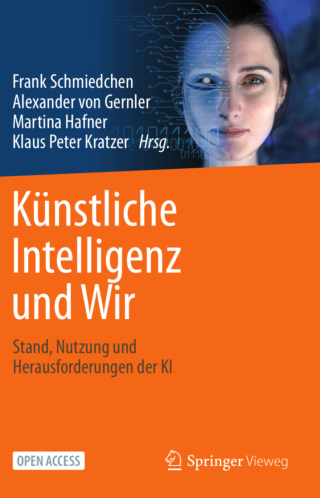Read next
Artificial Intelligence
Quantum computing and AI
There is great hope: even if quantum computers initially “merely” improve the simulations of quantum mechanical processes, they could, among other things, help to train AI systems more efficiently in the future. The first small quantum computers are already commercially available. But what potential do they actually have today?



© iStock/Peter Hansen
Classical computers can do a lot. But their capabilities have limits, for example, when it comes to simulating quantum mechanical systems such as molecules. Enter quantum computers: machines that directly rely on quantum principles for their calculations. The hope is that they will not only compute much more efficiently, but also push the boundaries of what is possible. This matters for developing new drugs and materials, optimizing logistics and production, solving differential equations (for example in fluid dynamics), and advancing machine learning. The potential economic impact is enormous: a Boston Consulting Group study projects up to US $ 80 billion in value from drug development and as much as US $ 100 billion from logistics over the next 15 to 30 years.
Principles of quantum computing
What actually distinguishes quantum computing from classical computers? While calculations on a classical computer are based on bits, which can take on the values 0 or 1, a quantum computer is based on qubits – they can be in a superposition of both quantum mechanical states |0⟩ and ∣1⟩ at the same time. This makes the operations fundamentally different. The power of quantum computers lies in quantum effects —superposition, entanglement, and interference. “Interference allows states to be amplified or attenuated, as is also known from classical waves,” writes Jeanette Miriam Lorenz, Head of the Quantum Computing Department at Fraunhofer IKS, in the book “Künstliche Intelligenz und Wir. Stand, Nutzung und Herausforderungen der KI”. Superposition, on the other hand, enables quantum computers to apply computations to multiple states simultaneously, naturally parallelizing the calculations.
Further advantages offered by quantum computers: Calculations are less complex and therefore likely to be more energy-efficient – an attractive prospect for high-performance computing, known for its substantial energy demands. Moreover, they are expected to enhance generalization, increase algorithmic processing power, and facilitate better separation of data points. However, while these benefits are intriguing, they remain largely theoretical for now, as they hinge on the existence of a perfect quantum computer free from errors and interference.

This article is based on the contribution by PD Dr. habil. Jeanette Miriam Lorenz, Head of Department at Fraunhofer IKS, in the book “Artificial Intelligence and Us. Status, Use, and Challenges of AI.” The editors are Frank Schmiedchen, Alexander von Gernler, Martina Hafner, and Klaus Peter Kratzer.
The book is available for free download at https://link.springer.com/book....
How can a quantum computer be technically implemented? There are various technologies available for this purpose. On the one hand, the two quantum mechanical states required can be realized via the atomic states of individual atoms or ions, for example via the ground state and an excited state. On the other hand, superconducting circuits that generate an oscillator with different states are also suitable. While several manufacturers have introduced quantum computers, challenges persist. Shielding these quantum systems from environmental disturbances remains a significant hurdle—even minor interferences can compromise their delicate quantum properties. For instance, cosmic radiation can strike a quantum chip, potentially triggering charge avalanches that may lead to catastrophic failures. Additionally, the current generation of quantum computers is limited to only a few qubits, and supercomputers struggle with simulations involving around 40 qubits. As it stands, these quantum machines are only capable of handling relatively small calculations and are not yet suitable for industrial applications.
Quantum-enhanced AI
In the long run, quantum computing holds great promise, particularly in medicine, where AI algorithms are increasingly used for diagnosis and decision support. Currently, doctors employ AI to identify bone fractures and tumors in MRI and CT scans, but they face challenges due to the limited training data — often just 100 to 1,000 images. The stakes are high, as decisions must prioritize patient safety. Quantum-enhanced AI could bridge this gap in the long run by delivering effective results with less training data. Meanwhile, traditional algorithms continue to evolve, creating a competitive landscape between classic and quantum approaches. The question remains: which will ultimately offer superior performance?
Quantum neural networks
The second pillar of quantum machine learning is found in quantum neural networks, which differ significantly from their classical counterparts. While traditional neural networks operate through alternating linear and nonlinear sequences, quantum neural networks rely solely on linear transformations. Ongoing research is exploring whether nonlinearities are essential for these quantum systems or if they could be detrimental. One thing is certain, though: quantum neural networks can effectively complement classical neural networks, creating exciting possibilities for hybrid approaches.
The extent of entanglement required for quantum neural networks to showcase their advantages remains unclear, as does the nature of the necessary data. Training these networks on quantum computers raises a host of unanswered questions. Traditional training methods are only partially effective and cannot be directly applied; the complexities of the quantum realm make the training process significantly more challenging. Additionally, noise poses a further obstacle, complicating the training even more.
Are quantum computers big data machines?
Quantum computers excel at performing numerous calculations simultaneously, leading to the question: Are they the solution for managing the ever-expanding volumes of data in our digital world? In essence, can they be considered big data machines? The critical hurdle lies in quantum memory, or QRAM, which has yet to be practically realized. Effective data storage is essential for processing large datasets, and current quantum computers are only capable of tackling very small problems. When faced with larger challenges, various disruptive effects, such as quantum decoherence, can completely undermine the results. “For these reasons, current quantum computers are not yet suitable as big data machines, and the future remains uncertain,” notes Lorenz.
First successes are becoming evident
Currently, available quantum computers are neither large nor reliable enough to offer a significant advantage over classical machines for industrially relevant issues. However, the development of quantum computing hardware is steadily progressing. For instance, IBM has successfully conducted experiments with a specific algorithm that could no longer be computed using classical methods, utilizing a superconducting quantum computing chip with 127 qubits. This synergy of software, algorithms, and hardware allows quantum computers to start competing in areas where classical algorithms have traditionally dominated.


